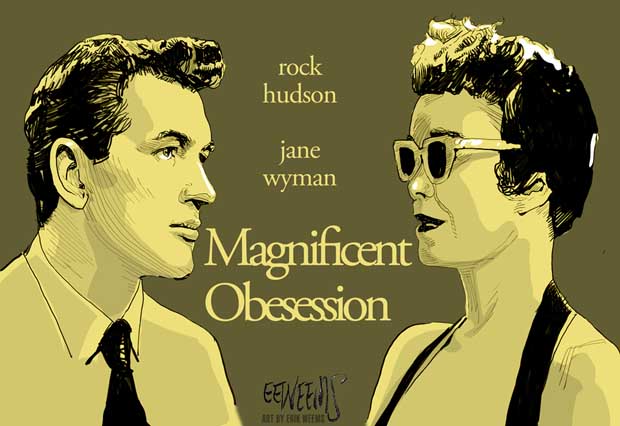Magnificent Obsession - 1954
Directed by Douglas Sirk
Magnificent Obsession is both a powerful story of a self-centered rich playboy (Rock Hudson) finding meaning and redemption after being destructively selfish by choosing to begin living a reborn life of being a servant to others, and also it is the presentation of a Hollywood version of what that means, i.e., looking very, very good while doing it.
The story has been adapted before (and borrowed from since) and it's almost like a Capra tale pushed to a whole different level but without Capra's main script writer Robert Riskin's leveling ingredient of street-level sarcasm, irony and self-awareness. Which is to say, Magnificent Obsession wants us to take it (very) seriously, and for the most part that's not too hard to do.
Magnificent Obsession is the kind of 1950s melodrama that can be liked in spite of itself, or disliked and perhaps mocked on account of its emotional razzmatazz presented in that heightened form that flourished in the 50's. In films like On the Balcony, Rebel Without a Cause and in Tennessee Williams' films, the emotive powers of the actors are enlarged by the camera and made to fill out the screen like a special effect. These unique movies showcase the emotional lives of the characters in a similar way that superhero movies burnish and emphasize the muscles of costumed men and women, and in the story the heroes must bounce back from defeat suffered in the first act so that they can finally find the secret to triumphing in the third.
Defeat is how Magnificent Obsession begins when self-absorbed, arrogant rich boy Bob Merrick (Hudson) is given a key to resolving his guilt when he indirectly causes the death of a beloved local doctor and then falls for and is rejected by the widow (Wyman) who he consequently causes to go blind when she tries to avoid him by getting out of a taxi into oncoming traffic and is struck by a car. What is that key to resolving the double load of guilt Merrick is carrying? Serving humankind (which he is warned will become an obsession once he "aligns himself" to this way of life) and so he thinks his self-sacrificing will mean specifically serving the widow Jane Wyman. In order to do so he assumes a duplicate identity of Rob Robinson who the now blinded Wyman won't recognize as the detestable Merrick.
Magnificent Obsession has many fine scenes that are well directed, staged perfectly and Wyman and Hudson (along with child actor Judy Nugent) get to have a low-key oasis with a series of lake scenes in the middle of the movie. These perform as a break from the roller-coaster before and what's coming next. But the (almost) sadistic plot is lurking, and it will separate the lovers and make a reunion seem impossible.
Ultimately events leave Wyman trapped in her darkness and Merrick far away working himself into old age as a doctor at a hospital, surrounded by other doctors who sound like the younger Merrick. By now grey-templed, Merrick is talking like our story's original wise-man Randolph, played by Otto Kruger, who passed along the 'secret' of selfless service when Merrick was desperately looking for a way back to his feet. The only incongruity with this is that Otto appears later in the movie and looks the same as he did 90 minutes earlier, only Hudson has changed. And that's all to the good since the earlier Hudson of the movie seemed to be on an emotional amphetamines whether trying to "live it up" or trying to resolve his humiliation as the magnet for disaster. The story (adapted from the 1935 movie of the same name and the source novel by Lloyd Davis) is almost a story about selfless sacrifice the same way that the sound track continually keys up a melody line that is almost Beethoven's Ode to Joy.
AMAZON: Magnificent Obsession (The Criterion Collection)
What's Recent
- Grand Exit - 1935
- Island of Desire - 1951
- Road to Morocco
- The Devil and Miss Jones - 1941
- Sinners - 2025
- Something for the Boys - 1944
- The Mark of Zorro - 1940
- The Woman They Almost Lynched - 1953
- The Cat Girl - 1957
- El Vampiro - 1957
- Adventures of Hajji Baba – 1954
- Shanghai Express 1932
- Pandora's Box – 1929
- Diary of A Chambermaid - 1946
- The City Without Jews - 1924
- The Long Haul
- Midnight, 1939
- Hercules Against the Moon Men, 1964
- Send Me No Flowers - 1964
- Raymie - 1964.
- The Hangman 1959
- Kiss Me, Deadly - 1955
- Dracula's Daughter - 1936
- Crossing Delancey - 1988
- The Scavengers – 1959
- Mr. Hobbs Takes A Vacation - 1962
- Jackpot – 2024
- Surf Party - 1964
- Cyclotrode X – 1966
Original Page Dec 2018
